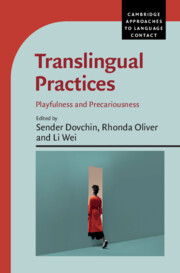Book contents
- Translingual Practices
- Cambridge Approaches to Language Contact
- Translingual Practices
- Copyright page
- Contents
- Figures
- Tables
- Contributors
- Foreword
- Acknowledgements
- 1 Introduction
- Part I Beyond Translingual Playfulness
- Part II Online Activism
- Part III Critical Pedagogy
- 9 ‘Because I Growed up … Big Martu Ways’
- 10 Translanguaging, Translinguality, and Labor
- 11 The Political Underbelly of Translingual Practices in English-Medium Higher Education
- Part IV Ways Forward
- Index
- References
9 - ‘Because I Growed up … Big Martu Ways’
Translating the Playfulness and Precarity in Translanguaging for Critical Pedagogy
from Part III - Critical Pedagogy
Published online by Cambridge University Press: 07 May 2024
- Translingual Practices
- Cambridge Approaches to Language Contact
- Translingual Practices
- Copyright page
- Contents
- Figures
- Tables
- Contributors
- Foreword
- Acknowledgements
- 1 Introduction
- Part I Beyond Translingual Playfulness
- Part II Online Activism
- Part III Critical Pedagogy
- 9 ‘Because I Growed up … Big Martu Ways’
- 10 Translanguaging, Translinguality, and Labor
- 11 The Political Underbelly of Translingual Practices in English-Medium Higher Education
- Part IV Ways Forward
- Index
- References
Summary
In this chapter, we explore how multilingual Australian Aboriginal children who have Standard English as an additional language/dialect engage in translanguaging practices through both playfulness and precarity in the school context. We begin by exploring their various linguistic repertoires and then examine how they playfully use translanguaging to move fluidly between these languages as they engage interactively both inside and outside the classroom. We discuss how such ‘translanguaging’ can contribute to learning by enabling Aboriginal students to take advantage of all the linguistic resources they have at their disposal which allow them to ‘construct, manage, negotiate and perform’ activities in positive ways within the classroom. However, there is precarity in the classroom meaning-making process because of the inherent linguistic racism of school as experienced by such students. Teachers often lack any understanding of the languages the students bring to school, which can result in teachers viewing student languages within a deficit model as ‘poor’ or ‘broken’ English. Yet the students’ facility with their languages, and the ease and confidence with which they move across languages, amply demonstrates the equality of their language to that of English. We propose that despite the challenges, language play can mitigate against the precarity.
- Type
- Chapter
- Information
- Translingual PracticesPlayfulness and Precariousness, pp. 165 - 181Publisher: Cambridge University PressPrint publication year: 2024
References
- 1
- Cited by

